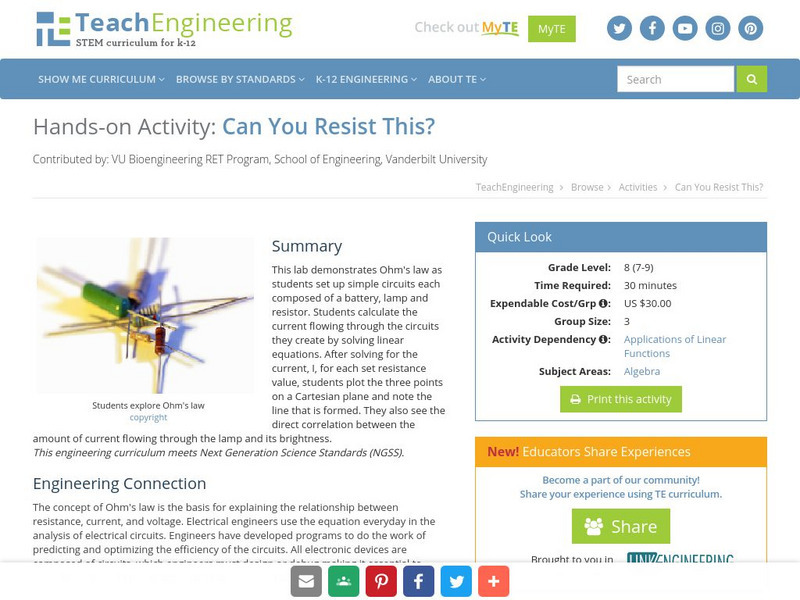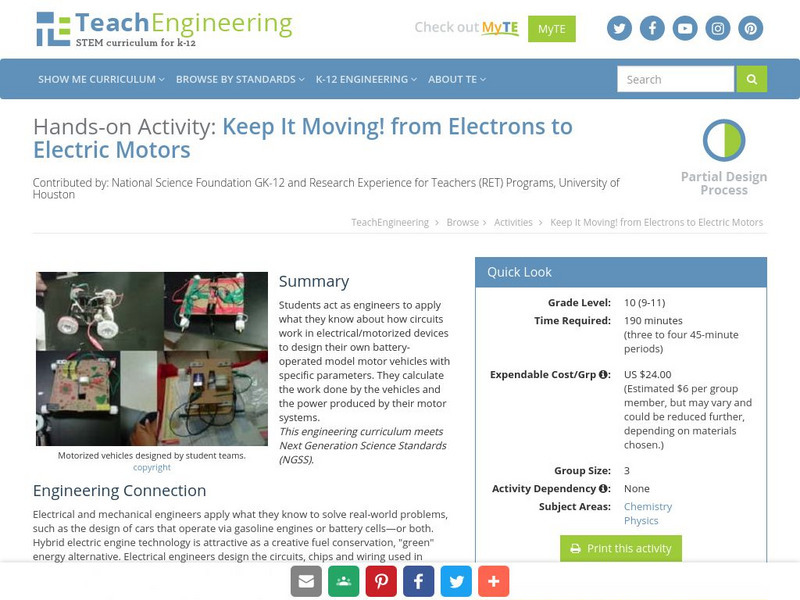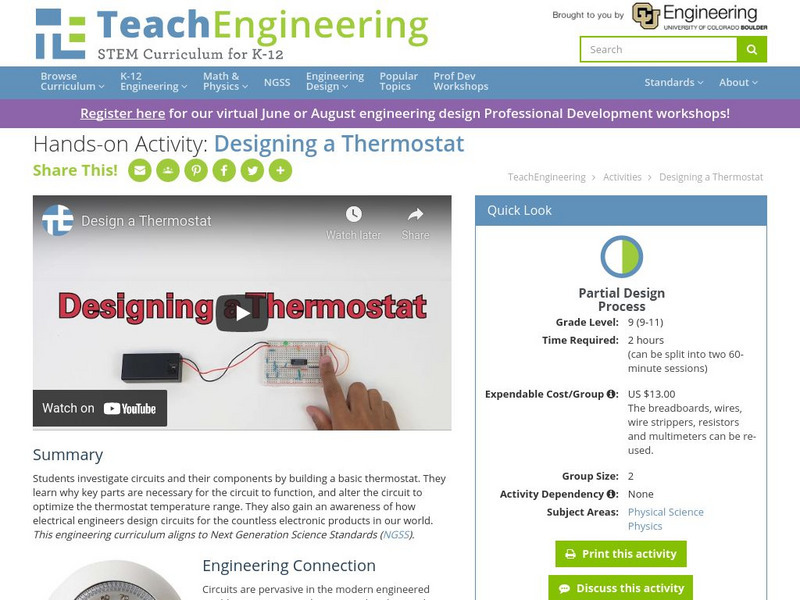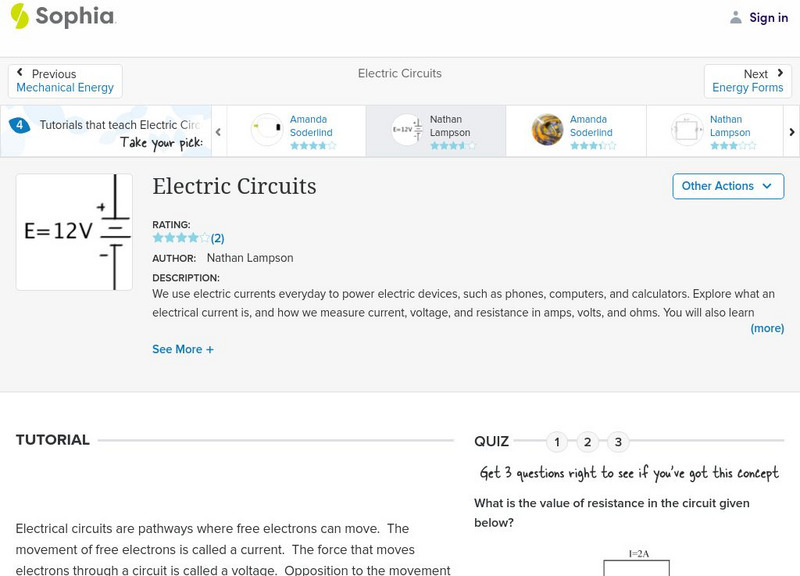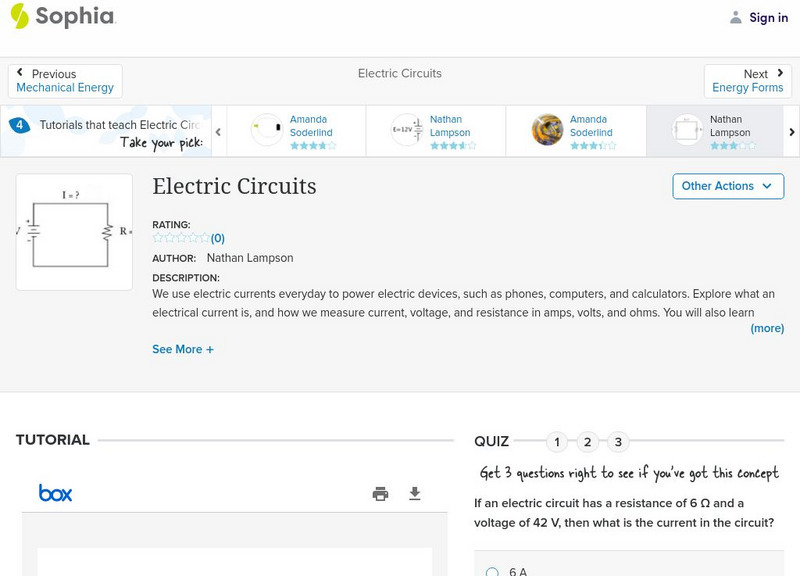Hi, what do you want to do?
TeachEngineering
Teach Engineering: Can You Resist This?
This lab demonstrates Ohm's law as students set up simple circuits each composed of a battery, lamp and resistor. Students calculate the current flowing through the circuits they create by solving linear equations. After solving for the...
TeachEngineering
Teach Engineering: Saltwater Circuit
Students build a saltwater circuit, which is an electrical circuit that uses saltwater as part of the circuit. Students investigate the conductivity of saltwater, and develop an understanding of how the amount of salt in a solution...
TeachEngineering
Teach Engineering: Keep It Moving! From Electrons to Electric Motors
Students act as engineers to apply what they know about how circuits work in electrical/motorized devices to design their own battery-operated model motor vehicles with specific paramaters. They calculate the work done by the vehicles...
Science Buddies
Science Buddies: Project Ideas: Which Materials Are the Best Conductors?
A simple science fair project to test whether electricity can flow between two things. The Science Buddies project ideas are set up consistently beginning with an abstract, objective, and introduction, followed by a section on terms,...
TeachEngineering
Teach Engineering: Whose Field Line Is It, Anyway?
Students teams each use a bar magnet, sheet of paper and iron shavings to reveal the field lines as they travel around a magnet. They repeat the activity with an electromagnet made by wrapping thin wire around a nail and connecting...
TeachEngineering
Teach Engineering: Designing a Thermostat
Students investigate circuits and their components by building a basic thermostat. They learn why key parts are necessary for the circuit to function, and alter the circuit to optimize the thermostat temperature range. They also gain an...
TeachEngineering
Teach Engineering: Sensing Air Pollution
Students learn about electricity and air pollution while building devices to measure volatile organic compounds (VOC) by attaching VOC sensors to prototyping boards. In the second part of the activity, students evaluate the impact of...
Physics Aviary
Physics Aviary: Practice Problems: Internal Resistance of Battery Problem
Determine the internal resistance of a battery based on the graph of terminal voltage vs. current. Also find the maximum current and the electrochemical potential.
Georgia State University
Georgia State University: Hyper Physics: Resistor Combinations
At this site from Georgia State University parallel and series connections of resistors are explained and illustrated. Equations for computing the overal voltage, current, and resistance of such circuits are given and explained.
Mocomi & Anibrain Digital Technologies
Mocomi: What Is Ohm's Law?
Explains Ohm's Law which is the mathematical relationship between electric current, resistance, and voltage.
Sophia Learning
Sophia: Electric Circuits: Lesson 2
This lesson will explain how to calculate voltage, current, and resistance in simple electric circuits. It is 2 of 4 in the series titled "Electric Circuits."
Sophia Learning
Sophia: Electric Circuits: Lesson 4
This lesson will explain how to calculate voltage, current, and resistance in simple electric circuits. It is 4 of 4 in the series titled "Electric Circuits."
Ducksters
Ducksters: Physics for Kids: Ohm's Law
Kids learn about Ohm's law in the science of electricity and physics including current, resistance, voltage, example problems, and V=IR.
ClassFlow
Class Flow: Electricity
[Free Registration/Login Required] Students can use this Flipchart to learn and apply Ohm's law to basic circuitry problems. Students are introduced to the relationship among voltage, current, and resistance, and then apply their newly...
Concord Consortium
Concord Consortium: Measuring Ac Circuits With a Dmm
Find out how the SPARKS DMM can measure AC voltage and current.
Concord Consortium
Concord Consortium: Dc Circuits: Series Parallel Resistances (Sparks 3)
Answer questions regarding voltage drops across resistors and currents through them in such circuits. Practice calculating the effective resistances of a set of resistances in series and parallel.
Physics Aviary
Physics Aviary: Simple Circuit Lab
This lab is designed to have students investigate the relationships between voltage, resistance and current in a circuit with only one passive component. The batteries in this simulation can be varied from ideal batteries to batteries...
Physics Aviary
Physics Aviary: Parallel Circuit Lab
This lab is designed to have students investigate the relationships between voltage, resistance and current in a parallel circuit with up to three passive components. The batteries in this simulation can be varied from ideal batteries to...
Concord Consortium
Concord Consortium: Dc Circuits: Parallel Resistances (Sparks 2)
Explore circuits with resistors in parallel and answer questions regarding voltage drops across resistors and currents through them in such circuits.
Concord Consortium
Concord Consortium: Dc Circuits: Series Resistances (Sparks 1)
This interactive simulation guides you through the wiring of the standard breadboard and presents you with questions regarding voltage drops and currents in series resistive circuits.
TeachEngineering
Teach Engineering: Completing the Circuit
In the everyday electrical devices we use - calculators, remote controls and cell phones - a voltage source such as a battery is required to close the circuit and operate the device. In this hands-on activity, students use a battery,...
Famous Scientists
Famous Scientists: Georg Ohm
Find out about the German physicist and mathematician whose work in the field of electrical current shaped the study of electricity.
CK-12 Foundation
Ck 12: Physics Simulation: Flashlight
[Free Registration/Login Required] Learn about electric circuits, the flow of current, electrical resistance, and electrical power dissipation by exploring the operation of a flashlight using this interactive simulation. A PDF worksheet...
CK-12 Foundation
Ck 12: Parallel Circuits
[Free Registration/Login may be required to access all resource tools.] In this lesson, students learn about parallel circuit design, and how to calculate equivalent resistance from resistors in a parallel circuit.





